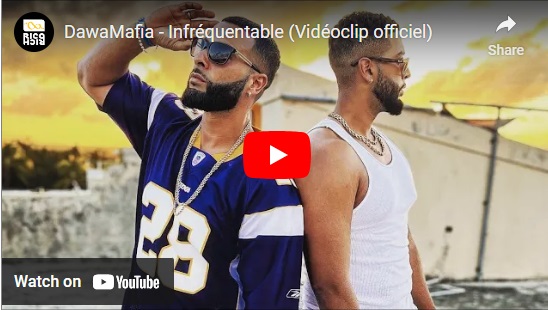 The album title, of their sixth LP as a duo, reflects the way brothers Zacka and Tali B see themselves. For them, Infréquentable (meaning “bad company”) is a way of accepting their past, and being at peace with what people think of them. “To this day, I see the distance between me and others. I feel it every day. It’s like I have ‘bad company’ stamped on my forehead. So I chose to accept it and to live with it,” explains Tali B, seven years younger than his brother.
The album title, of their sixth LP as a duo, reflects the way brothers Zacka and Tali B see themselves. For them, Infréquentable (meaning “bad company”) is a way of accepting their past, and being at peace with what people think of them. “To this day, I see the distance between me and others. I feel it every day. It’s like I have ‘bad company’ stamped on my forehead. So I chose to accept it and to live with it,” explains Tali B, seven years younger than his brother.
This clear demarcation between DawaMafia and the rest of the world is expressed in various ways on this new album, the duo’s first since 2020. Both rappers present themselves as mistrustful characters, who aren’t afraid of anything. Their secret weapon to confront the sometimes brutal gaze of others is quite simple: loyalty. “Loyalty is the most important quality to have for a man. If someone isn’t loyal, walk away from them,” says Zacka.
“We have two or three friends in our lives, but other than that, it’s family first,” adds Tali B. “Our family is made up of five brothers and two sisters. We’re a tight-knit family. I would die for my brother, and I know he would also die for me.”
They grew up Montréal’s South Shore suburb of Brossard. Renowned for its DIX-30 district and its more affluent areas, the city is also home to a poorer social class in its various low-income housing complexes. That’s where the duo’s roots lie. “Let’s just say we weren’t born with a silver spoon in our mouths,” says Zacka ironically. “We did what we needed to, to be where we’re at today.”
Throughout their teens, Tali B, Zacka, and the rest of their siblings built a solid reputation all over town for being makers of “dawa,” slang for mayhem. “There was always at least one brother that was causing chaos somewhere,” says Zacka. “Sometimes you’d get somewhere, and people would go, ‘You stirred shit up here last month, you ain’t coming in!’ And yet you’d never set foot in there! Our evenings would often end up with a fistfight. That was our daily life.”
Music rapidly became a fortress in which to hide from the chaos. “We’ve always made music. Before we recorded, we’d all freestyle together. Rap started taking up more and more space in our lives,” says Zacka.
As time went by, Zacka and Tali B emerged as the two most assiduous of the bunch when it came to music. After developing separate projects – as a solo act for Tali and as a member of various bands, notably Bagdad Musik, for Zacka – they decided to join forces officially as DawaMafia, in the second half of the 2010s. “We figured that if we were going to waste our time in various projects, it would be better to do it together. Nothing is stronger than this blood bond,” says Tali B.
“Initially it wasn’t very serious. It became serious once we stopped investing money in the project. I can say that something switched about three years ago,” says Zacka. “Sometimes, God puts people on your path, and for us it was Rico Rich [one of the bigger players on Québec’s rap scene]. He showed us how to structure things.”
“We’re at our peak, now. Right now, Infréquentable was released about two or three weeks ago, and we already have 2 million views,” says Tali B.
Beyond the numbers, Infréquentable’s content is striking. More than ever, the two brothers are in perfect symbiosis on the mic, seamlessly relaying each other’s flows and vocals with equal dexterity. “We strive to come across as singing and rapping all at once. We really meld both. We were inspired by what’s going on in the U.S. recently with artists like NLE Choppa and A Boogie wit da Hoodie,” says Tali B. “We help each other and work as a team. We have to project a connection. We’re a duo, not a ‘featuring.’ We’re a single artist.”
The duo’s evolution can also be heard in their lyrics. The two brothers talk about their past in a perspicacious way, revealing dark episodes of their lives without becoming overly dramatic or explicit. “Aujourd’hui, j’fais de l’art à plein temps/Avant j’faisais du tort à plein de gens” [freely: “Nowadays I make art full-time / Before, I used to do a lot of people wrong”], the duo confides on “Fast,” a song very representative of the rest of the album – which, slowly, over the course of its second half, introduces the idea of change and transformation.
Would the pair admit to gradually becoming more well-behaved? “I don’t know about well-behaved, but more mature, yes,” says Tali B. “We still have a lot of wisdom to gain.”
